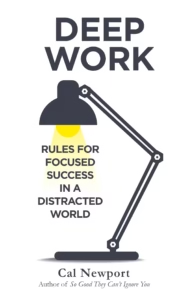In his book, Deep Work: Rules for Focused Success in a Distracted World, Cal Newport examines the importance of deep work, which he defines as intense and undistracted concentration on tasks that require significant intellectual effort. He posits that in today’s world, where distractions are rampant and superficial activities often dominate our attention, engaging in deep work is essential for producing exceptional results, developing advanced skills, and achieving sustained success in both our professional and personal lives.
Newport distinguishes deep work from “shallow work,” which involves tasks that are relatively easy to complete and replicate but lack substantial value. Throughout the book, he provides practical strategies aimed at fostering deep work habits. These strategies include creating scheduled periods for uninterrupted focus, reducing potential distractions, and intentionally facing moments of boredom, which can help to enhance one’s ability to concentrate.
Furthermore, Newport emphasizes the significance of aligning one’s efforts with clear objectives and meaningful outcomes, as doing so can significantly boost both productivity and overall satisfaction. Supported by research and real-life examples, Deep Work offers a comprehensive guide for individuals seeking to regain their focus and succeed in an environment that increasingly fragments our attention.

In his book, Deep Work: Rules for Focused Success in a Distracted World, Cal Newport highlights the significance of developing the capability to engage in what he terms “deep work.” This concept refers to the intense, concentrated effort dedicated to challenging cognitive tasks, which is increasingly vital in a contemporary landscape filled with distractions. Newport asserts that deep work is crucial for mastering intricate skills, producing high-quality outputs, and attaining meaningful success in a competitive and swiftly evolving economy. He distinguishes deep work from “shallow work,” which includes low-value activities such as answering emails or attending unnecessary meetings. These tasks can be easily replicated and contribute little to one’s expertise or career advancement.
The book is structured in two main sections: the first part elucidates the advantages of deep work and examines its declining prevalence, while the second part offers practical strategies for integrating deep work into daily routines. Newport attributes the decreasing frequency of deep work to societal norms that emphasize busyness and multitasking at the expense of productivity and focus. Furthermore, he discusses how persistent exposure to digital distractions—such as social media and instant messaging—diminishes the brain’s ability to maintain sustained concentration.
In the second portion of the book, Newport proposes concrete principles for cultivating deep work habits. These principles include scheduling dedicated periods devoid of interruptions for focused work, creating environments that reduce distractions, and training the mind to accept boredom rather than constantly seeking stimulation. He introduces frameworks like the “4DX framework,” which align deep work with personal and professional objectives, and advocates for minimizing or altogether eliminating shallow work to free up more time for meaningful endeavors.
Newport also underscores the necessity of aligning deep work with individual values and finding fulfillment in activities that contribute to a greater purpose. He encourages readers to critically assess their relationship with technology, endorsing the selective adoption of tools that boost productivity while avoiding those that fragment attention. Drawing on research and real-life examples of successful people who engage in deep work, Newport illustrates how this approach can lead to superior outcomes in both intellectual and creative endeavors.
Ultimately, Deep Work serves as a comprehensive guide for reclaiming focus, enhancing productivity, and thriving amidst the distractions of modern life. Newport conveys a clear message: individuals who develop the capacity for deep work will differentiate themselves, achieve greater accomplishments, and experience heightened satisfaction in both their personal and professional lives.
Deep Work: Rules for Focused Success in a Distracted World, authored by Cal Newport, was published in January 2016 by Grand Central Publishing. This work emerged as a response to Newport’s observations regarding the increasing prevalence of distractions and shallow work in contemporary life, particularly as the digital era transformed professional settings. Drawing from his academic expertise as a professor of computer science and his personal experiences in productivity, Newport designed the book to blend practical advice with scholarly insights into focus and cognitive performance.
Upon its release, Deep Work received positive acclaim from both critics and readers, who appreciated its clarity, actionable strategies, and its significance in confronting modern challenges related to attention and productivity. The book rapidly ascended to bestseller status, resonating with a diverse audience that includes professionals, creatives, and students, and it played a pivotal role in establishing Newport’s reputation as a leading voice in the field of productivity and focus. Over time, its influence has continued to expand, with many considering it a fundamental resource for succeeding in the attention economy.
Leave a Reply